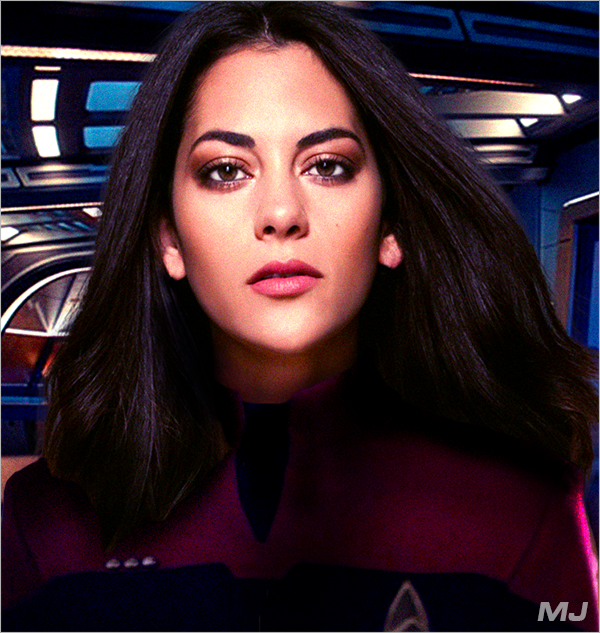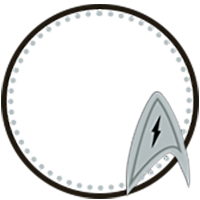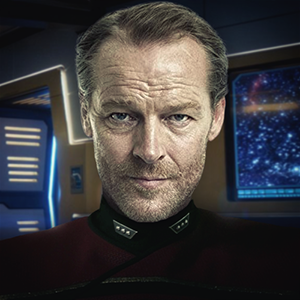‘This whole idea’s real cute,’ Corias Ash said with unusual gruffness. ‘But I don’t get how we can help.’
Peliax leaned forward, setting her clasped hands on the dark oak meeting table in the CWP’s main office. Rain lashed against the tall windows on the upper level, dark clouds roiling to block any hint of daylit skies beyond. Soft light from lamps cast only gentle illumination, leaving the staff sat between gentle circles of gold, long shadows, and gloomy corners. ‘The Avalon Group can make sense of the crisis. That isn’t only about understanding the Borg attack or the Changeling infiltration.’
‘Sure,’ said Corias, scratching his ridged nose. ‘But we’re historians exploring an on-off border war with the Cardassians. What’s that got to do with half the fleet getting assimilated and killing the other half the fleet?’
Locke, stood at the top of the table, raised his hands. ‘We’re getting ahead of ourselves.’ His voice sounded reedier and more desperate than he’d like. ‘I wanted us to start with introductions. Everyone, this is Lieutenant Olivia Quinn. She’s come off front-line service for a tour on Avalon and will be heading up Digital Archaeology.’
He gestured to the young, nervous-looking officer sat halfway down the table, her dark hair in a shoulder-length bob. Her uniform was crisp and tidy, in contrast to most of the rest of the CWP; all of them but Locke himself and Commander T’Falith were out of uniform. She gave a small nod in a quick, officious greeting. ‘It’s a pleasure to meet you all. I’m sorry it’s not under better circumstances.’
Corias shifted his weight. ‘Not your fault,’ he said, and though his smile was forced, it was not wholly insincere. ‘Welcome to the team.’
Locke cleared his throat. He did not want any of them to linger on how Quinn had been sent to fill a personnel gap Frontier Day had opened. ‘Let me make introductions. This is Lieutenant Commander Corias Ash. He runs our Oral Histories team, seeking veterans of the Cardassian Wars and related incidents, and conducts interviews and gathers testimonies.’ He waved a hand at the burly Bajoran, his red hair a little longer than regulation length, a speckle of stubble across his strong jaw.
‘On one side,’ came the low, gravelly comment from the foot of the table. Corias visibly bristled, and Locke tried to move on.
‘Lieutenant Commander Peliax, Public History. She helps shape our research and its use for public engagement, museology, etc.’ He nodded to the Denobulan, her black hair tied back tidily. Though she was not in uniform, the IHSW taking on far more the atmosphere of an institution of scholarship than a Starfleet outpost, she still wore crisp formalwear. Peliax gave a polite smile.
‘Lieutenant Commander T’Falith,’ Locke said. ‘Archival Research – in the CWP, that’s usually gathering and analysing historical news records, and, increasingly, Starfleet reports that have been declassified.’
‘Not only Starfleet,’ came her immediate clarification. Locke struggled to describe T’Falith as anything but Vulcan, her short hair simple and tidy, her strong features perpetually calm and poised. While she was easily the most reliable and disciplined of his team, she was also the most stubborn if driven to disagree. Or be pedantic. ‘Now we have avenues to access records of the Cardassian Union.’
Locke grimaced as Corias rolled his eyes. ‘Yes – of course,’ he said quickly, not wanting to open that can of worms. ‘We’ve got some exciting new opportunities here. There’s also Sawl Tyran, Historical Archaeology, but he’s…’
‘Pissed off on another expedition.’ Corias said that with more of a hint of a chuckle. ‘He likes fieldwork more than anyone.’
‘What is the practical difference for this team,’ came the gravelly voice from the foot of the table, ‘between historical archaeology and digital archaeology?’
Locke bit his lip. It was hard to not read a challenge in the question, and he drew a deep breath. ‘And this,’ he said at last, looking to Quinn rather than the speaker, ‘is Gul Kaled, our liaison from the Cardassian Union.’ His eyes swept down to the Cardassian, the other man’s eyebrows still raised in question. Locke sighed. ‘There’s crossover. Sawl deals with things like sites of historic battles, where we can learn from pretty much anything and everything about the location. Lieutenant Quinn focuses on the technology from such findings. She’s been recruited because of her expertise in historical Starfleet computer systems and software, and her familiarity with Cardassian systems.’
‘I expect,’ said Quinn, looking down the table to Kaled, ‘that Commander Tyran will recover components, storage devices, and the like, from his fieldsites, and get them shipped back here, where I have the equipment to properly extract and analyse the data on them.’
Kaled gave a small grunt, and nodded. His dark eyes met Locke’s. ‘The Avalon Group wants us to, effectively, wave the flag, then.’
‘I’m not sure that’s -’
‘This is an organisation of historical research. We have no capacity to comprehend how the Borg attacked or how the Changeling infiltration was so successful,’ Kaled continued in his low, clipped voice. ‘In these circumstances, history serves to give context and inspiration. Waving the flag.’
Corias curled his lip. ‘We’re not here just for some feel-good revisionism -’
‘Crises and major attacks,’ said Kaled, as if Corias hadn’t spoken. ‘Starfleet and the Federation have suffered many of these in their past. Mars. The Breen attack on San Francisco. The Changeling bombing in 2373. And that is merely in living memory. Your IHSW should focus on those: how Starfleet and the Federation has endured after major attacks. Both in terms of practical lessons and personal inspiration.’
Silence met his words. Locke’s throat tightened, and it took Peliax tilting her head and speaking up to break the moment. ‘That’s great,’ she said, cheerful and intrigued. ‘There are useful lessons and warnings. It’ll need handling very carefully to not exploit historic tragedy, but with the right presentation and contextualisation, we can remind people that they’ve survived these kinds of blows before.’
Quinn opened her mouth, then hesitated. ‘You’ll have to forgive me; I’m not specifically an expert on this era – uh, not yet. How do the Cardassian Wars fit into this? It was a pretty one-sided conflict…’
‘Which ended with a peace treaty that birthed the Maquis and paved the way to the Dominion War,’ said Locke, frowning. ‘There’s a lot to learn from that kind of capitulation.’
Corias shook his head. ‘Setlik III.’
Peliax winced, her eyes flickering from Corias in the direction of Kaled. ‘I’m not sure that the massacre is…’
‘It is ideal.’ Kaled’s voice was low, firm. ‘Though Commander Locke’s point about the treaty has merit also.’
Corias twisted. ‘You really want us to talk about how the Cardassian Union slaughtered hundreds of civilians?’
‘Now with the benefit of records from the Union that tell a broader truth,’ said Kaled coolly.
‘What truth?’
Kaled shrugged. ‘That the Union believed it was a staging post for an invasion.’
‘Oh, sure,’ scoffed the Bajoran. ‘We’re going to tack on a load of Cardassian revisionism to talk about how they were just misled by the Federation into thinking it was a military target -’
‘We have never before considered Setlik III with cooperation from the Cardassian government,’ came T’Falith’s cool interjection. ‘This may also permit us to explore a new line of inquiry: from the Setlik III massacre to the assistance the Third Order rendered the Federation at Deneb.’
‘So they help us out now, and that makes up for a massacre?’ said Corias.
‘A sixty year-old tragedy,’ said T’Falith. ‘Nobody has forgotten Setlik III. We should not ignore it. We may thus address it, and remind everyone that it is not the most important factor in our relationship with the Cardassian Union.’
‘You’re right,’ sneered Corias. ‘We do have the Occupation and Dominion War to influence our thinking.’
‘Let’s take a look,’ Locke said sharply, raising his hands. ‘At both, in fact. Peliax, Corias, can you take point on the treaty? Plenty of information’s already in our hands; it’s just a question of contextualising it. See if we can put at least a paper out for one of the conferences.’ He looked to the foot of the table. ‘Commander T’Falith. Please work with Gul Kaled to put an initial proposal together on a project about Setlik III.’ The Vulcan was the best Federation officer to examine Setlik III dispassionately and the person least likely to be frustrated by Kaled.
Kaled turned at once to T’Falith. ‘It is best we consult the public Cardassian records regarding Setlik III and we can assess them for suitability. If we are to appeal to the government to release more information, we must be clear about what we want, and why.’
‘I have been appraising myself of the bureaucratic systems of the Union,’ said T’Falith, with the closest thing to enthusiasm Locke ever saw from a Vulcan. ‘I am prepared to engage in these request protocols.’
‘You can… get on with that,’ Locke sighed, waving a hand at them. Taking this as a dismissal, the tall Cardassian and far, far shorter Vulcan stood and headed in the direction of the research archives. He blew out his cheeks and looked at the other three. ‘Lieutenant Quinn, I’d be happy to help you get situated.’
Corias looked more relaxed now Kaled was gone. ‘Also, he’s being all fancy today,’ he told Quinn, leaning forward. ‘We don’t really do ranks and stuff quite as much here. We’re historians, not bridge officers. Call me Ash.’
The tension dissipating, Quinn gave a small, relieved smile. ‘Olivia. Or just O.’
Locke looked at Corias. ‘You okay, Ash?’
‘You’ve made sure I don’t have to work with Gul Dickhead,’ the Bajoran said with a shrug. ‘Pel and I can talk about the moral cowardice of the Federation making things worse in the long-run. A warning lesson for everyone. You think Blackwood will like this idea?’
‘It’s a good one,’ Locke admitted. ‘Even if it does come from Kaled.’
‘Yeah.’ Corias rolled his eyes, then looked at the doors the two had disappeared through. ‘By the way. Since when did he and T’Falith get so cosy?’
Quinn raised her eyebrows. ‘That was cosy?’
Peliax winced. ‘For the commander? Positively gushing.’
One Week Earlier
Frontier Day
‘…and I would be intrigued to see how we might expand our archives with cooperation from the Cardassian Union,’ T’Falith said, turning from the research archive offices back to Gul Kaled. ‘But that concludes our tour.’
Kaled’s eyes swept over the gloomy chamber, its shelves filled with record PADDs and desks with built-in consoles for accessing the extensive records. The IHSW kept multiple versions of all manner of records, many isolated from the main Starfleet database. In minute details could history sometimes be unravelled.
But the Cardassian gul merely gave a low grunt. ‘The facilities seem adequate. Although needlessly isolated from the main operations of Avalon.’
‘Commodore Blackwood believes there is merit to a focused environment where historians may work alongside one another without distraction. Particularly from other Starfleet personnel or researchers, who may have different priorities to the IHSW.’
Kaled turned to her, tilting his head. ‘And what are the priorities of the IHSW?’
T’Falith didn’t miss a beat. ‘To comprehend historic conflicts of Starfleet, how they occurred, and what can be learnt, in order to avert future such conflicts.’
‘I see. You seek to frame these conflicts in a manner that suits Starfleet’s ethics,’ he sighed.
Her brow furrowed only a micron. On T’Falith, it was a scowl. ‘We seek the truth.’
‘The truth? In history?’ Kaled scoffed. ‘There’s no such thing.’
‘I am familiar with the Cardassian Union’s propensity to frame historic events through a lens that supports their current policy agenda,’ T’Falith countered. ‘This is not how Starfleet operates.’
‘What if the lessons you find are that a conflict was inevitable? Or bore an untenable price?’ he said flatly. ‘Does Starfleet then have to accept that they were right to initiate violence?’
She paused. ‘You seek to bait me. To draw me into a declaration you would assert exposes hypocrisy in Starfleet.’
Kaled’s eyebrows raised. ‘That’s an illogical leap to a conclusion, Commander. I’m only seeking to understand the outfit I’ve been banished to.’
‘Banished.’
Another scoff. ‘Do you think this assignment was of my own choice?’
‘If you are not interested in engaging in the CWP then I am sure Commander Locke may find you some ceremonial duties,’ said T’Falith, straightening an iota. ‘But please clarify that so I spend my time with you efficiently.’
An arched eyebrow. ‘You mean ignore me.’
‘That is down to you, Gul, and however you wish to make use of my time.’
He opened his mouth to respond – then was cut off by a blaring alarm. At once his brow furrowed. ‘Is that a fire?’
‘…no.’ T’Falith couldn’t help but hesitate as she took three quick steps towards a console. ‘That is the security emergency klaxon.’
‘How does a ground-based historical research facility have a security emergency?’ Kaled snapped, looking about the empty archives.
‘That is truly unclear.’ But a few taps on the controls gave only some irritated blats of the system. ‘I am locked out. Protocol dictates we should hold position until we receive the all-clear.’
‘Curious. I’m not bound by your protocol,’ Kaled pointed out. ‘And I won’t stand by in a crisis when I don’t know what’s going on.’
But before he could leave or she could stop him, the doors slid open. In walked a pair of young researchers, their gaits stiff. In the tension of the mysterious alarm and lockout, T’Falith didn’t properly process this as she stepped out from behind the console. ‘Ensigns – report.’
Instead of a report, their hands snapped up, and she found phasers in their faces.
‘Eliminate the unassimilated.’

 Bravo Fleet
Bravo Fleet










